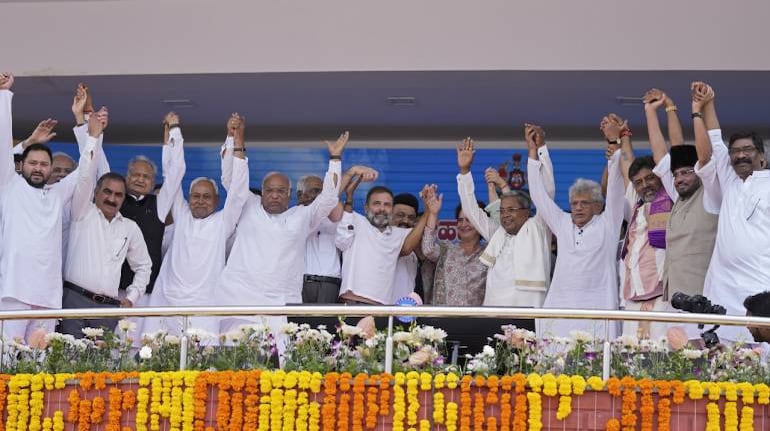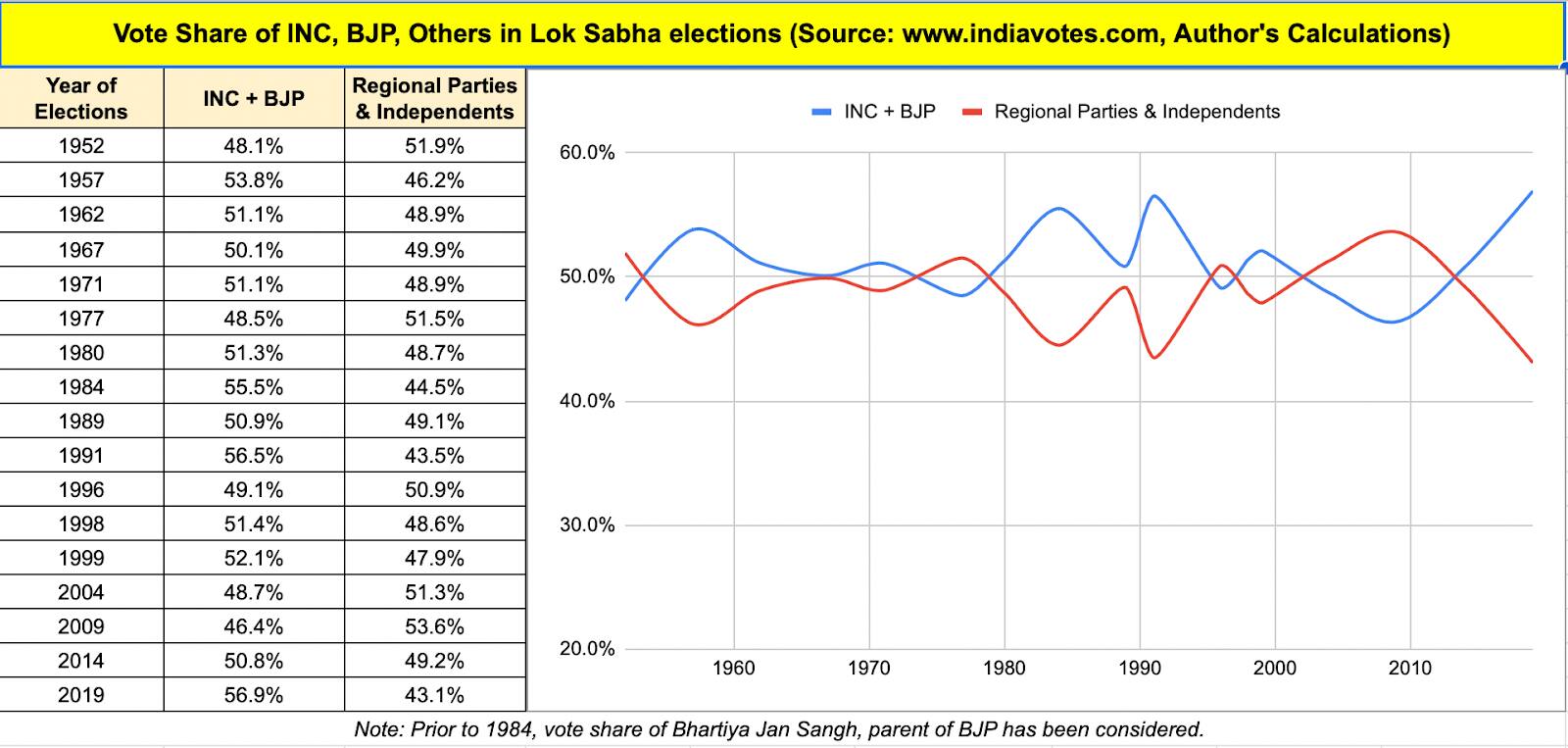



The Karnataka win and increase in popularity ratings of Rahul Gandhi after the success of Bharat Jodo Yatra has rejuvenated the Congress cadre and leadership ahead of the grand finale in 2024.
Regional parties like TMC and SP which were opposed to any tie up with the Congress over its performance in the past have struck a conciliatory note, recognising that the grand old party won Karnataka by making a severe dent in the vote base of JD(S).
Congress Gain, At Regional Parties’ Cost
A recent CSDS survey shows Congress is expected to get 29 percent vote share in Lok Sabha if elections are held today, that’s a handsome 10 percentage point gain over 2019. Surprisingly BJP, too, is expected to get 39 percent vote share, a gain of 2 percentage points.
Congress is gaining entirely at the expense of Others (regional parties). The survey projects 28 percent vote share for Others which will be an all time low if it happens and is also indicative of increasing bipolarity in national elections, on the lines of state elections.
The historical vote share average of regional parties in general elections from 1952-2019 has been 49 percent, while for Congress and BJP combined, 51 percent. Regional parties have always been an integral part of our Lok Sabha representing regional aspirations/demands/issues.
Over the years, when BJP improves its position in Lok Sabha, Congress declines. In contrast, regional parties, either as part of an alliance led by either of these two parties or as non-aligned entities, maintained their vote share (on an average).
The previous worst performance of regional parties has been around 43 percent in 2019. But even then, it must be noted that regional parties are in power in 16 states and could be in contention in 353 seats (either winner or runner-up in 2019) for the 2024 Lok Sabha elections.

Worries For Regional Parties
Congress over the years has lost significant vote share, some to BJP (upper caste, OBCs), and rest to regional parties (minorities, dalits and tribals, who once comprised its core vote bank).
Many regional parties have grown at the expense of the grand old party or have been born out of anti-Congressism.
In Punjab and Gujarat, Congress lost ground to AAP last year in state elections. However, it could make a comeback in general elections like in Delhi in 2019, where a split voting was witnessed. AAP was not expected to beat the saffron party at the national level and slid to third place behind Congress in the Lok Sabha polls.
In Uttar Pradesh, Congress has been reduced to a non-entity and SP has emerged as the main contender to BJP as minorities have helped it create a solid M-Y (Muslim-Yadav) votebank. Here too, Congress harbours hopes of wooing minorities and repeating its 2009 Lok Sabha performance when it bagged 21 seats.
The assembly elections in late-2023 in three Hindi heartland states are a direct BJP versus Congress fight where local dynamics will play a dominant role.
Regional forces, already reduced to a limited presence – like BSP, SP, Janata Congress Chhattisgarh and Gondwana Ganatantra Party – in MP, Rajasthan and Chhattisgarh, could find themselves further marginalised.
In Telangana, it is a triangular fight at state level, and four-sided in the Hyderabad region. If Congress gains vote share it is likely to come at the expense of both BRS and AIMIM (minorities) as well as BJP (consolidation of anti incumbency votes).
If Congress gains in Maharashtra, it could make its alliance partner NCP nervous as it has been largely built on the grand old party’s vote bank. Congress flexing muscles could further push NCP towards BJP.
Opposition Unity Complicated
Strengthening of the Congress party means that it would stake its claim to be the fulcrum of any joint opposition alliance. It gives Congress an upper hand in bargaining for more seats in the Hindi heartland and eastern India.
It quashes the hopes of socialist forces like Nitish Kumar of leading any such alliance. Fear of loss of Muslim votes, poor and downtrodden may force regional satraps like Mamata and Akhilesh to have some sort of understanding with the Congress.
An upbeat Congress is likely to look for expansion of UPA and deal with only those parties who accept its leadership position. But it’s still too early to conclude that Congress will improve its position substantially in 2024 at the cost of regional forces.
If Congress does well in the next round of state elections and is able to seize the headlines, and create a narrative of “vote for regional parties in state elections and national parties in national elections” then it can win back some vote blocs from regional parties.
However, public posturing of this kind would also be counterproductive to its efforts of forging opposition unity.
Amitabh Tiwari is a former corporate and investment banker-turned political strategist and commentator. Twitter: @politicalbaaba. Views are personal and do not represent the stand of this publication.
Discover the latest Business News, Sensex, and Nifty updates. Obtain Personal Finance insights, tax queries, and expert opinions on Moneycontrol or download the Moneycontrol App to stay updated!
Find the best of Al News in one place, specially curated for you every weekend.
Stay on top of the latest tech trends and biggest startup news.